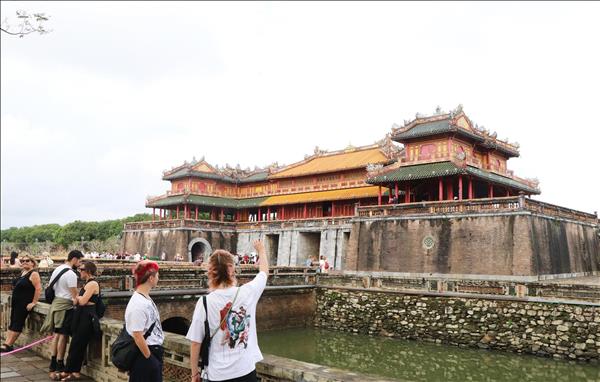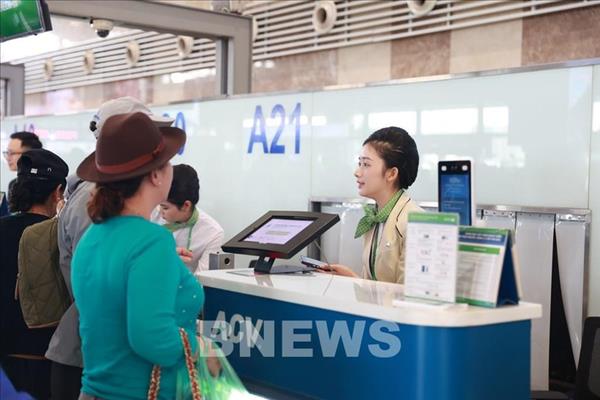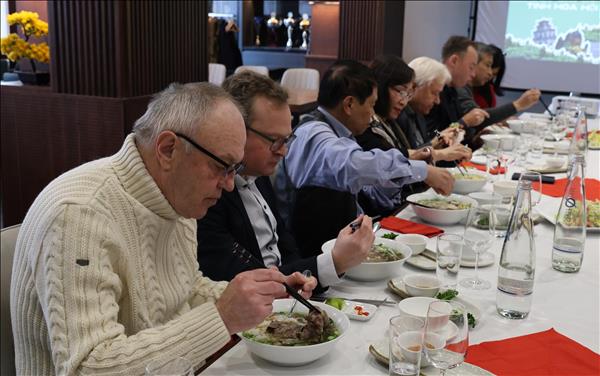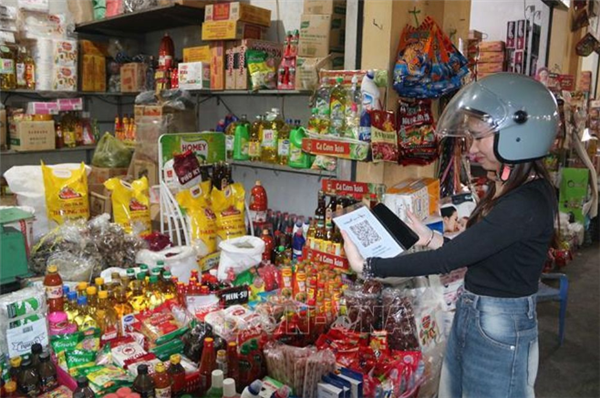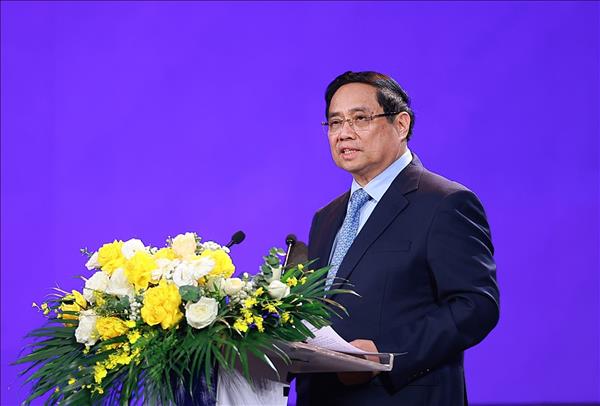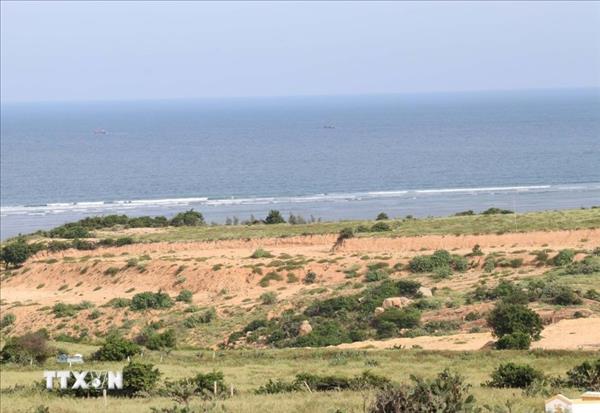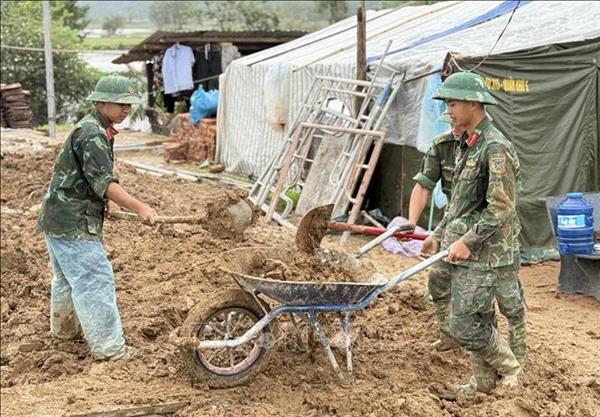2018 was a turbulent year in world events, full of ups and down. Below are the top 10 world events of 2018 selected by the Vietnam News Agency.
A turning point in the Korean Peninsula peace process: Korean Peninsula affairs recorded a breakthrough change with several historical events taking place in 2018. Inter-Korean summits resumed after a gap of more than a decade, adopting the Panmunjom Declaration for Peace, Prosperity and Unification of the Korean Peninsula on April 27 and the Pyongyang Joint Declaration on September 20. In addition, the first-ever summit between the US and the Democratic People’s Republic of Korea was held in Singapore and issued a Joint Declaration on June 12. These events helped turn the situation from the edge of war to dialogue and détente, opening hope of a denuclearised, peaceful and prosperous peninsula.
US – China confrontation: A trade war between the US and China with a series of tariff paybacks significantly impacted global trade, economy, and financial markets, dimming the forecast for global economic growth this year and in 2019, and pushing many countries to change their trade policies to avoid associated risks. The dispute has also expanded into other areas like technology, foreign diplomacy and military, reflecting hardening competition between the two sides.
A turning point in the Korean Peninsula peace process: Korean Peninsula affairs recorded a breakthrough change with several historical events taking place in 2018. Inter-Korean summits resumed after a gap of more than a decade, adopting the Panmunjom Declaration for Peace, Prosperity and Unification of the Korean Peninsula on April 27 and the Pyongyang Joint Declaration on September 20. In addition, the first-ever summit between the US and the Democratic People’s Republic of Korea was held in Singapore and issued a Joint Declaration on June 12. These events helped turn the situation from the edge of war to dialogue and détente, opening hope of a denuclearised, peaceful and prosperous peninsula.
US – China confrontation: A trade war between the US and China with a series of tariff paybacks significantly impacted global trade, economy, and financial markets, dimming the forecast for global economic growth this year and in 2019, and pushing many countries to change their trade policies to avoid associated risks. The dispute has also expanded into other areas like technology, foreign diplomacy and military, reflecting hardening competition between the two sides.
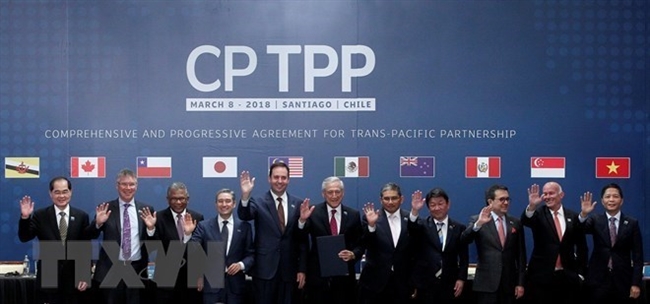 Officials of the CPTPP members pose for a photo at the agreement signing event in Chile last March. Photo: AFP/VNA |
CPTPP signed and about to enter force: The Comprehensive and Progressive Agreement for Trans-Pacific Partnership (CPTPP) – a replacement of the Trans-Pacific Partnership Agreement (TPP) – was inked on March 9 and will take effect from January 2019. Consisting of 11 members, including Vietnam, the CPTPP is one of the most comprehensive trade deals ever concluded. Once fully implemented, the pact will cover a market of 500 million consumers, with a combined GDP accounting for 13.5 percent of global GDP. The negotiation of the CPTPP following the withdrawal of the US is significant to maintaining investment links and freer trade in Asia-Pacific amid growing protectionism.
Thorny path to Brexit: After very tough negotiations for the UK to leave the EU – or Brexit, on November 25, the two sides agreed on a draft political declaration to shape their future relationship. However, the Brexit progress is still plagued with latent uncertainties as it faces barriers from the British Parliament, which is divided over controversial customs conditions. The future of Brexit is unpredictable and exiting without a deal remains a possibility.
Riots in Paris, France: The “yellow vests” movement, motivated by rising fuel taxes, has expanded fast and escalated into riots, described as the worst in France for decades, and even spread to other countries. The movement has exposed deep social and economic divisions in France, forcing President Emmanuel Macron’s government to make concessions.
Tension between Russia and Europe: Relations between Russia and Europe have almost reached the lowest level in years after former Russian double agent Sergei Skripal was poisoned in the UK in March. The confrontation was also reflected in most of the world’s pressing issues like in Syria, Ukraine and the Korean Peninsula. The tension accelerated following the launch of US investigations into alleged Russian interference in the 2016 American presidential election. The US has not only added a series of sanctions on Russia but also threatened to withdraw from the Intermediate-Range Nuclear Forces Treaty (INF), raising concerns about a new “Cold” War. Meanwhile, the Russian government said that these moves were part of a campaign coordinated by Western governments to harm Russia’s prestige and isolate the country.
The US pulls out from the Iran Nuclear Deal: Neglecting international rules and norms, US President Donald Trump on May 8 unilaterally withdrew from the nuclear agreement with Iran, which was finalised by his predecessor Barack Obama’s administration in 2015, and restored sanctions against Iran. The move has threatened the economic interests of many countries and caused cracks in the relationship between the US and its European allies. Many countries criticised the US’s actions to damage trust in the international order and said it could increase instability risks in the Middle East.
Earthquake and tsunami in Indonesia: A strong earthquake and associated tsunami hitting Sulawesi island on September 28 and a tsunami, triggered by an eruption of the Anak Krakatau volcano in the Sunda Strait – which lies between Sumatra and Java islands – on December 22 have taken the lives of at least 2,370 people, injured more than 1,400 others and left some 5,130 unaccounted for. Previously, in late July and early August, Lombok island experienced two earthquakes of 6.4 and 7 magnitude, killing more than 400 people, destroying dozens of thousands of houses, temples and forcing approximately 20,000 to evacuate.
Fake news and user data leak on social networks: The spread of “fake news” on social media platforms, from Facebook to Twitter and Whatsapp, have caused real consequences. Fake news has been accused of contributing to the manipulation of election outcomes, provoking violence, deepening ethnic conflicts, causing social division and triggering political instability in many nations. The reputations of tech giants like Facebook and Google has been shaken following their involvement in security breach scandals that exposed millions of user accounts. Facebook’s stock lost 120 billion USD in market value at one point and the firm’s revenue growth has significantly decelerated this year. The leaders of Facebook, Twitter and Google had to testify before the US Congress and ultimately vowed to come up with measures for a healthy cyberspace.
Journalist Jamal Khashoggi murdered: The murder of Saudi Arabia journalist Jamal Khashogg inside Saudi Arabia’s consulate general in Istanbul, Turkey, on October 2, shook global public opinion. It set off a diplomatic crisis between Saudi Arabia and its Western allies and caused the country’s regional reputation to deteriorate. Several countries have announced travel bans imposed on Saudi citizens and urged the United Nations to launch an international probe into the case. The US Senate voted to end military aid for Saudi Arabia in the Yemen war, while the German government has halted all arms trade with the country, and Canada is considering to cancel its sale of armoured vehicles to its Middle East ally.
Thorny path to Brexit: After very tough negotiations for the UK to leave the EU – or Brexit, on November 25, the two sides agreed on a draft political declaration to shape their future relationship. However, the Brexit progress is still plagued with latent uncertainties as it faces barriers from the British Parliament, which is divided over controversial customs conditions. The future of Brexit is unpredictable and exiting without a deal remains a possibility.
Riots in Paris, France: The “yellow vests” movement, motivated by rising fuel taxes, has expanded fast and escalated into riots, described as the worst in France for decades, and even spread to other countries. The movement has exposed deep social and economic divisions in France, forcing President Emmanuel Macron’s government to make concessions.
Tension between Russia and Europe: Relations between Russia and Europe have almost reached the lowest level in years after former Russian double agent Sergei Skripal was poisoned in the UK in March. The confrontation was also reflected in most of the world’s pressing issues like in Syria, Ukraine and the Korean Peninsula. The tension accelerated following the launch of US investigations into alleged Russian interference in the 2016 American presidential election. The US has not only added a series of sanctions on Russia but also threatened to withdraw from the Intermediate-Range Nuclear Forces Treaty (INF), raising concerns about a new “Cold” War. Meanwhile, the Russian government said that these moves were part of a campaign coordinated by Western governments to harm Russia’s prestige and isolate the country.
The US pulls out from the Iran Nuclear Deal: Neglecting international rules and norms, US President Donald Trump on May 8 unilaterally withdrew from the nuclear agreement with Iran, which was finalised by his predecessor Barack Obama’s administration in 2015, and restored sanctions against Iran. The move has threatened the economic interests of many countries and caused cracks in the relationship between the US and its European allies. Many countries criticised the US’s actions to damage trust in the international order and said it could increase instability risks in the Middle East.
Earthquake and tsunami in Indonesia: A strong earthquake and associated tsunami hitting Sulawesi island on September 28 and a tsunami, triggered by an eruption of the Anak Krakatau volcano in the Sunda Strait – which lies between Sumatra and Java islands – on December 22 have taken the lives of at least 2,370 people, injured more than 1,400 others and left some 5,130 unaccounted for. Previously, in late July and early August, Lombok island experienced two earthquakes of 6.4 and 7 magnitude, killing more than 400 people, destroying dozens of thousands of houses, temples and forcing approximately 20,000 to evacuate.
Fake news and user data leak on social networks: The spread of “fake news” on social media platforms, from Facebook to Twitter and Whatsapp, have caused real consequences. Fake news has been accused of contributing to the manipulation of election outcomes, provoking violence, deepening ethnic conflicts, causing social division and triggering political instability in many nations. The reputations of tech giants like Facebook and Google has been shaken following their involvement in security breach scandals that exposed millions of user accounts. Facebook’s stock lost 120 billion USD in market value at one point and the firm’s revenue growth has significantly decelerated this year. The leaders of Facebook, Twitter and Google had to testify before the US Congress and ultimately vowed to come up with measures for a healthy cyberspace.
Journalist Jamal Khashoggi murdered: The murder of Saudi Arabia journalist Jamal Khashogg inside Saudi Arabia’s consulate general in Istanbul, Turkey, on October 2, shook global public opinion. It set off a diplomatic crisis between Saudi Arabia and its Western allies and caused the country’s regional reputation to deteriorate. Several countries have announced travel bans imposed on Saudi citizens and urged the United Nations to launch an international probe into the case. The US Senate voted to end military aid for Saudi Arabia in the Yemen war, while the German government has halted all arms trade with the country, and Canada is considering to cancel its sale of armoured vehicles to its Middle East ally.
VNA/VNP

